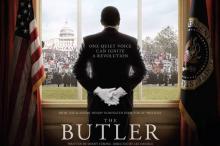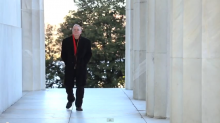March on Washington

As people stepped on our toes and stood anxiously in front of us, waiting to exit the crowded theater, three of us sat weeping at the close of Lee Daniels’ The Butler. Even now, as I recall that moment, it brings tears to my eyes.
How do I describe the movie? Utterly intense. Remarkable. Heartbreaking. Inspiring. A genius capturing of the complexities of the Civil Rights Movement, of the history of race in America in the 20th and early 21st centuries, of presidential decision making, and of family.
I sat next to my colleague, Lisa Sharon Harper, who sobbed at the violence, tragedy, and passionate courage displayed on screen. It was a challenge. To be a white woman sitting next to an African-American woman as she wept over the suffering of her people — often at the hands of my people. It was neither her nor I who had perpetrated these specific acts, but we are certainly still caught in the tangled web of systemic racism and the histories that our ancestors have wrought us.
Even as we had waited in the theater prior to the movie's start, we spoke of serious subjects. She shared some of her lineage and the challenges of legal records that simply do not exist when ancestors are slaves or perhaps a Cherokee Indian who escaped the Trail of Tears in Kentucky and suddenly appears on the U.S. Census in 1850 as an adult. We spoke of her leadership in the church, and I encouraged her to continue speaking even though she is one of the lone women who graces the stages in front of national audiences. I told her, "You must do this so that other women who come after you can do this. You must do this for women right now. You must do this so that I can do this." We bonded over being women in ministry.
And then the separation came. I do not know Lisa's shoes — the road that she walks due to the color of her skin. I see her in all of her glory — passion, intelligence, creativity — and not in all of her blackness. Our world sees her with racial eyes.

This year marks the 150th anniversary of both the issuing of Emancipation Proclamation and the battle of Gettysburg. This month marks the 50th anniversary of the historic March on Washington and Dr. Martin Luther King, Jr.’s “I Have a Dream” speech. All three moments marked major turning points in the fundamental American struggle to actualize the divine dream of life, liberty, and equality for all. That dream has been especially powerful through the struggle for African-American freedom.
From a biblical perspective, American slavery and Jim Crow segregation not only subjugated the body. For about 300 years, from Virginia’s first race-based slave laws in the 1660s to the passage of the Voting Rights Act in 1965, the legal binding of black hands, feet, and mouths also bound spirits and souls. Both slavery and Jim Crow laws denied the dignity of human beings made in the image of God and forbade them from obeying God’s command to exercise Genesis 1:28 “dominion” — in today’s terms, human agency.
So, the Emancipation Proclamation and passage of the 13th, 14th, and 15th Amendments were cause for jubilee worship in black churches and among other abolitionists. Likewise when the Civil Rights Act passed in 1964 and the Voting Rights Act passed in 1965, churches across the nation erupted again in worshipful jubilee.
Now, nearly 50 years after the second American jubilee, African Americans are being stripped of dignity and constitutionally protected freedoms like we have not seen since Jim Crow.

The Dream at 50
This August marks the 50th anniversary of the historic March on Washington for civil rights for African Americans. PBS will feature special broadcast and Web programming, including the premiere of the new documentary The March onTuesday, Aug. 27 (check local listings). pbs.org/black-culture/explore
The Miracle of Meaning
Secular Days, Sacred Moments: The America Columns of Robert Coles, edited by David D. Cooper, collects 31 short essays by the respected child psychiatrist and Pulitzer Prize-winning author. Whatever the topic, Coles offers thoughtful insights on civic life and moral purpose. Michigan State University Press

It may have taken a little bit of prodding — a little ‘you-want-me-to-do-what?’ and a lot of faith — but in the end, Congressman John Lewis agreed to go along with staffer Andrew Aydin’s out-of-the-box idea. The result: March (Book 1) — the first of a three-part graphic novel autobiography chronicling Lewis’ life and the Civil Rights Movement.
“The story of the movement that we tell is very much John Lewis’ story in this first book,” Aydin said. “It is a story of him growing up poor, on a farm, and it builds to a climax of the national sit-in movement.”
Lewis certainly has a lot to tell. He and other activists famously were beaten by police on the Edmund Pettus Bridge in Selma, Ala., in 1965 during an attempted march for voting rights — an event that became known as “Bloody Sunday.” He served as chairman of the Student Nonviolent Coordinating Committee during the height of the movement, spoke at the historic March on Washington alongside Dr. Martin Luther King, Jr., and was instrumental in the passage of the Voting Rights Act of 1965.
Aydin, who co-wrote the book with Congressman Lewis, and illustrator Nate Powell sat down with Sojourners to explain how the series came about and why it is such an important story these 50 years later.

I recently went back to the Lincoln Memorial to tell the story of how and why I wrote my new book, On God’s Side: What Religion Forgets and Politics Hasn’t Learned About Serving the Common Good. And I reflected on my favorite Lincoln quote, displayed on the book’s cover:
“My concern is not whether God is on our side: my greatest concern is to be on God’s side.”
I invite you to watch this short video, and to engage in the discussion as we move forward toward our common good. Blessings.
It’s been 50 years since several significant events of the civil rights movement of the 1960s occurred, yet our society is still plagued with systemic racism. It’s been almost 150 years since we abolished slavery in this country, yet many are still enslaved daily by the oppression of discrimination and poverty. While significant strides in equality and justice have taken place, new systems of injustices have been instated and threaten the integrity of our much-stated rights of “life, liberty, and the pursuit of happiness.”
I am most presently thinking of the system of the “New Jim Crow,” something author and advocate Michelle Alexander has awakened society to with the recent publication of her book with that title. The New Jim Crowrefers to the web of injustices related to mass incarceration and the stripping of basic rights of returning citizens reminiscent of the Jim Crow laws of our nation’s history. Today, returning citizens face “legalized discrimination” from employers and landlords, making it extremely difficult for them to get a job or a place to live. Additionally, in many states they are not allowed to sit on a jury or express their right to vote, meaning their voices are stifled.
!['Civil Rights March on Washington, D.C. [Dr. Martin Luther King, Jr., President of the Southern Christian Leadership Conference, and Mathew Ahmann, Executive Director of the National Catholic Conference for Interrracial Justice, in a crowd.], 08/28/1963' photo (c) 1963, The U.S. National Archives - license: http://www.flickr.com/commons/usage/](http://lh3.ggpht.com/-XUAmAA_vWKI/Ti7l4ZavSOI/AAAAAAAACS8/0Y0EfQ03QzA/Flickr-4101511358.jpg) How should music rank among the ever-growing list of time-tested nonviolent methods such as boycotts, marches, strikes, sit-ins, and vigils?
How should music rank among the ever-growing list of time-tested nonviolent methods such as boycotts, marches, strikes, sit-ins, and vigils?
Anthony Shadid of the New York Times reports that a song, "Come on Bashar, Leave," is spreading across Syria, boldly calling on President Bashar al-Assad to step down. (Bryan Farrell also wrote about it at the Waging Nonviolence blog.) The article suggests that a young cement layer who chanted it in demonstrations was pulled from the Orontes River this month, his throat having been cut, and, according to residents of the city of Hama, his vocal chords torn out. Hama is where, in 1982, then-president Hafez al-Assad, father of the current president named in the song, gave orders to the army to massacre more than 10,000 in putting down an Islamist upheaval. Today, boys 6-years-old and older vocalize their own rendition of the original warbler's song instead. As the song has sped across Syria, demonstrators have adopted it for themselves.
"I had no idea Martin Luther King was a radical!" These shocked words were spoken to me this weekend after an activist training I'd been running in Sydney. I had the privilege to be part of the Make Poverty History "action lab" -- a "teach-in" for 15 young anti-poverty activists chosen from each state of Australia.
Last weekend, the nation had an opportunity to reflect, commemorate, and celebrate the March on Washington and Dr.
[Editor's Note: In anticipation of the anniversary of the March on Washington on August 28, 1963, God's Politics will feature a series of posts on the legacy of Dr. Martin Luther King.